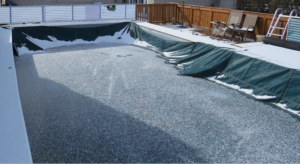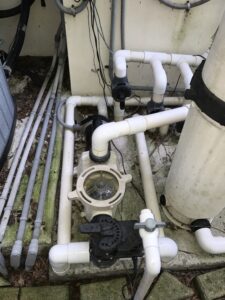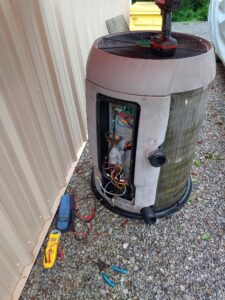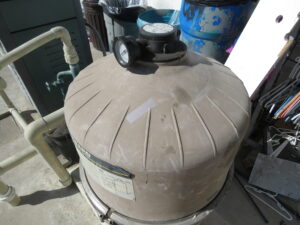Freeze Damage to Pool Equipment
Changing weather patterns are leading to record cold winters in many parts of the country, according to the extended forecast of the Farmers’ Almanac. Freezing temperatures can affect outdoor components that most people don’t think about in the winter: pool equipment. Pool pumps, heaters, and filters are vulnerable to freeze damage, particularly when they haven’t been properly prepared and maintained.
Neglecting pool maintenance in winter months can lead to equipment failure from freeze damage.
Adjusters should know how pool equipment is affected by freeze damage before settling this type of claim. It’s also important to obtain an expert assessment to determine whether this equipment can be returned to pre-loss condition through repair or replacement with Like Kind and Quality components.
Pool Pumps
Pool pumps pull water from the pool, then move it through pipes to other equipment, including filters and heaters. These elements are essential to keeping the water clean, sanitary, and at a more consistent temperature.
The pool pump carries water through a system of pipes to other equipment for treatment. Expanding freezing water can cause cracks in these pipes.
Cracks that result from the pressure of freezing water in the pipes may be immediately evident if they’re wide enough to be visible and cause leakage in above-ground components. Other cracks may be too small to notice in thick plastic pipes or may occur in underground elements and therefore not be identified when they happen. However, even small cracks in the pump body and connectors cause the pump to not prime, because the pump can’t create a vacuum to draw water.
Indicators of water frozen inside the pump itself include leaks and buzzing, laboring sounds when starting the pump. Repairs to pool pumps may be difficult, and often epoxy will not hold enough to prevent leaking once the pump is cracked. However, Like Kind and Quality replacements may return a pump to its pre-loss condition without requiring a more expensive upgrade.
Pool Heaters
A pool heater takes cool pool water from the pool pump into a tank and circulates heated water back to the pool to ensure a comfortable temperature. While electric, gas, and solar heaters draw heat from different sources, they are all at risk for freeze damage.
Keeping water cycling through a pool heater, such as this one, is important to both the pool and the heater itself in subfreezing temperatures.
While it may seem counterintuitive to keep water at a constant temperate when the pool isn’t in use in colder months, it’s important to keep the heater running in below freezing temperatures; this is more about circulation that keeps the water from freezing in the tank.
When water freezes, it expands 9 percent according to the International Association for the Properties of Water and Steam. When it’s contained inside a vessel like a tank or a pipe, this expansion can lead to cracking. In a pool heater, this most likely manifests in leaking from the headers, where water can be trapped, and at the pressure switch, which keeps the heater from running when there is low flow.
If the pool heater does sustain freezing damage, some repairs may be possible. If a professional assessment finds that cracked components require replacement, it’s critical to know which parts can be replaced with Like Kind and Quality equipment.
Pool Filters
The pool pump draws pressurized water into the filter, where the dirty water is forced through the filter media (usually silica sand, paper cartridges, or diatomaceous earth). Clean water comes out of the other side of the filter and returns to the pool.
Because pool filters are a pressure vessel, frozen water in the chamber can lead to cracks that result in leakage. The pressure gauge within the filter can also sustain freeze damage. It’s easy to identify when a pressure gauge is damaged; any reading other than 0 indicates a problem.
A damaged pressure gauge can pose a threat not only to functionality but also to safety.
The pressure within a pool filter means that a freeze-damaged filter poses a safety risk and should not be operated, especially if the pressure gauge is affected. A cracked filter can also be complicated to repair because most repair methods cannot hold up to the pressure inside of it. However, an expert can identify a Like Kind and Quality replacement that can restore the equipment.
Adjusters can potentially prevent unnecessary claims leakage by verifying the cause of loss to confirm pool equipment included in freeze claims is not functioning as designed and is malfunctioning because of a covered peril. Scope of damage should be evaluated to determine if repairs or replacements are required.
StrikeCheck’s average cycle time is five days for residential claims, enabling adjusters to settle claims quickly with everything they need. Submit a claim to StrikeCheck to ensure your next pool equipment claim is settled accurately.




